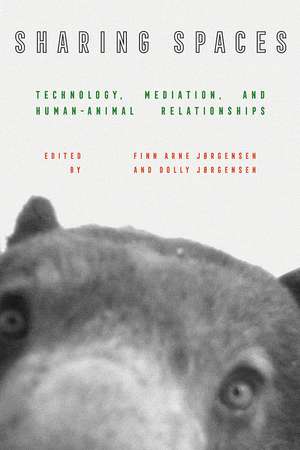Sharing Spaces: Technology, Mediation, and Human-Animal Relationships: INTERSECTIONS: Histories of Environment
Editat de Finn Arne Jorgensen, Dolly Jorgensenen Limba Engleză Hardback – 29 oct 2024
Din seria INTERSECTIONS: Histories of Environment
-
 Preț: 436.80 lei
Preț: 436.80 lei -
 Preț: 200.41 lei
Preț: 200.41 lei -
 Preț: 400.33 lei
Preț: 400.33 lei -
 Preț: 430.27 lei
Preț: 430.27 lei -
 Preț: 359.45 lei
Preț: 359.45 lei -
 Preț: 492.26 lei
Preț: 492.26 lei -
 Preț: 427.77 lei
Preț: 427.77 lei -
 Preț: 459.98 lei
Preț: 459.98 lei -
 Preț: 500.91 lei
Preț: 500.91 lei -
 Preț: 333.77 lei
Preț: 333.77 lei - 15%
 Preț: 457.24 lei
Preț: 457.24 lei -
 Preț: 320.52 lei
Preț: 320.52 lei -
 Preț: 350.79 lei
Preț: 350.79 lei -
 Preț: 387.44 lei
Preț: 387.44 lei
Preț: 461.72 lei
Nou
Puncte Express: 693
Preț estimativ în valută:
88.35€ • 94.48$ • 73.66£
88.35€ • 94.48$ • 73.66£
Carte disponibilă
Livrare economică 27 martie-10 aprilie
Preluare comenzi: 021 569.72.76
Specificații
ISBN-13: 9780822948308
ISBN-10: 0822948303
Pagini: 296
Dimensiuni: 152 x 229 mm
Greutate: 0.59 kg
Editura: University of Pittsburgh Press
Colecția University of Pittsburgh Press
Seria INTERSECTIONS: Histories of Environment
ISBN-10: 0822948303
Pagini: 296
Dimensiuni: 152 x 229 mm
Greutate: 0.59 kg
Editura: University of Pittsburgh Press
Colecția University of Pittsburgh Press
Seria INTERSECTIONS: Histories of Environment
Recenzii
“How are our relationships with animals mediated by technology and what are the ethical and moral implications of those entanglements? Through case studies that range across species, spaces, and times, this critically important collection explores how technologies—whether tracking devices, cameras, or monitoring tools—both connect and alienate us from animals, creating opportunities for both greater understanding and exploitation.”
—Tina Loo, University of British Columbia
“This rich collection chronicles some of the ways technologies shape human relationships with animals. While some of these relationships are exploitative, here also are chronicled relations of care and symbiotic partnerships. The case studies are fascinating, the analysis consistently attuned to the complexities of these entanglements.”
—Emma Marris, author of Wild Souls: Freedom and Flourishing in the Non-human World
“Sharing Spaces offers a highly sophisticated and much welcome contribution to the fields of environmental studies, human-animal studies, and science and technology studies. It serves as an excellent example of how these three fields can be brought into a very fruitful conversation.”
—Dorothee Brantz, Technische Universität Berlin
—Tina Loo, University of British Columbia
“This rich collection chronicles some of the ways technologies shape human relationships with animals. While some of these relationships are exploitative, here also are chronicled relations of care and symbiotic partnerships. The case studies are fascinating, the analysis consistently attuned to the complexities of these entanglements.”
—Emma Marris, author of Wild Souls: Freedom and Flourishing in the Non-human World
“Sharing Spaces offers a highly sophisticated and much welcome contribution to the fields of environmental studies, human-animal studies, and science and technology studies. It serves as an excellent example of how these three fields can be brought into a very fruitful conversation.”
—Dorothee Brantz, Technische Universität Berlin
Notă biografică
Finn Arne Jørgensen is professor of environmental history at University of Stavanger, Norway. He is the author of two monographs on environment and infrastructure: Making a Green Machine and Recycling. He codirects, with Dolly Jørgensen, the Greenhouse Center for Environmental Humanities at University of Stavanger and is coeditor, with Sarah Elkind, of the Intersections series at the University of Pittsburgh Press.
Dolly Jørgensen is professor of history at University of Stavanger, Norway. She is the author of Recovering Lost Species in the Modern Age: Histories of Longing and Belonging and The Medieval Pig. She is coeditor-in-chief of the journal Environmental Humanities and codirects, with Finn Arne Jørgensen, the Greenhouse Center for Environmental Humanities at University of Stavanger.
Dolly Jørgensen is professor of history at University of Stavanger, Norway. She is the author of Recovering Lost Species in the Modern Age: Histories of Longing and Belonging and The Medieval Pig. She is coeditor-in-chief of the journal Environmental Humanities and codirects, with Finn Arne Jørgensen, the Greenhouse Center for Environmental Humanities at University of Stavanger.
Descriere
A new addition to the University of Pittsburgh Press Intersections series
